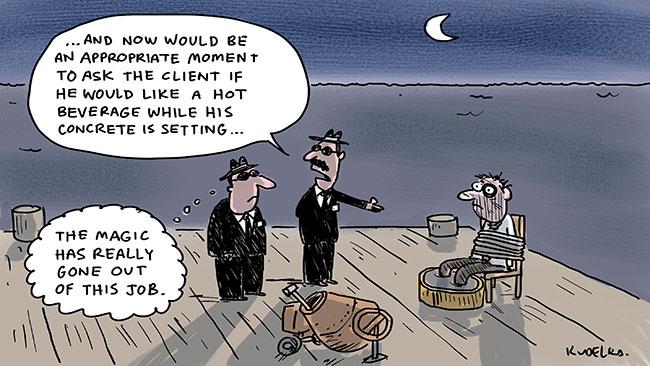In the footsteps of James Gandolfini's Tony Soprano, television's good guys turn bad
JAMES Gandolfini created a monster: like Tokyo after a visit from Godzilla, the pop-cultural landscape was altered permanently by Tony Soprano.

JAMES Gandolfini created a monster: like Tokyo after a visit from Godzilla, the pop-cultural landscape was altered permanently by Tony Soprano. Since the troubled wiseguy first went to therapy in 1999, television has unexpectedly become the most vital of creative media.
Thinking people spend vast chunks of each week deconstructing the latest episode of their favourite show as if it were 19th-century literature. And thanks to the late, great Gandolfini, the protagonists of the best-loved dramas on the small screen can be bald, overweight, or bald and overweight, or a dwarf, or Steve Buscemi.
With the Italian-American mob, The Sopranos took a prettified big-screen genre and made it small and ugly. Michael Corleone's organised criminal activities in The Godfather were governed by an old-world honour code; Tony's work was grubby and ignoble. The godfather of suburban New Jersey was a middle-aged lunk, not a svelte young Pacino.
Cable now puts a premium on anti-heroic character actors: Michael Chiklis of The Shield, Ian McShane of Deadwood, Peter Dinklage of Game of Thrones. Not only are TV's leading actors now non-traditional, but so are the characters they play. In his history of small-screen drama's ongoing golden age, The Revolution Was Televised, Alan Sepinwall writes The Sopranos dispelled "the notion that a TV series had to have a likable character at its centre. Why, TV executives had been asking for 50 years, would viewers want to come back week after week to watch a jerk, a crook, or worse?"
The Sopranos broke that mould. Now, the narrative arc of television's best dramas bends towards injustice. Tony wasn't interested in redemption or self-improvement. In spite of his regular sessions with Dr Melfi, he just got worse. Subsequent protagonists have followed a similar downward trajectory, most spectacularly Breaking Bad's Walter White (Bryan Cranston): a mild-mannered chemistry teacher with lung cancer who during the course of the following 4 1/2 seasons has become a scheming, murderous meth kingpin.
As the Tony Soprano effect turned character actors into leading men, it also had the opposite effect: turning leading men into character actors. The dashing Jon Hamm was not cast as Man Men's mercurial ad creative Don Draper simply because he was good-looking but rather because the role demanded good looks. When viewers first encountered the talented, compulsively adulterous Draper, he seemed like another lovable rogue with a past. Yet as the series has progressed, and Hamm's performance has developed, the glossy exterior has peeled back to reveal a rotten core. Like Tony and Walter, Don has become not merely an antihero, but the villain of his show.
The novel-like narratives of these series have also enriched their peripheral characters: Roger Sterling of Mad Men, Saul Goodman of Breaking Bad, or The Wire's fearless gay stick-up artist, Omar Little. Character actors have a chance to shine in small parts as well as large.
These phenomena remain almost exclusive to US cable-TV channels HBO, AMC and Showtime. The most influential network dramas of the past decade, by contrast, were led by conventionally handsome fellows such as Matthew Fox (Lost) and Kiefer Sutherland (24), and populated by attractive co-stars whereas the supporting cast of, say, Game of Thrones, consists largely of British actors with questionable teeth. Or, at least, the male supporting cast does. Though Game of Thrones is full of funny looking blokes, its female characters are mostly gorgeous, and frequently naked. Similarly, while Tony Soprano may have made it possible for male protagonists to sink to new depths, the same is not yet true for women. There remains, if you will, a glass floor for female roles.
Gandolfini was plucked from relative obscurity to play Tony, but his legacy means such roles are increasingly prized, not least by character actors lured from the big screen. The star of The Sopranos' most direct descendant, organised-crime saga Boardwalk Empire, is Buscemi. Kevin Spacey may just win the first Emmy award for a web-only acting role, for his performance as congressman Frank Underwood in Netflix's series House of Cards. But though his influence is everywhere, we may never see the like of Tony Soprano again.
The Independent


